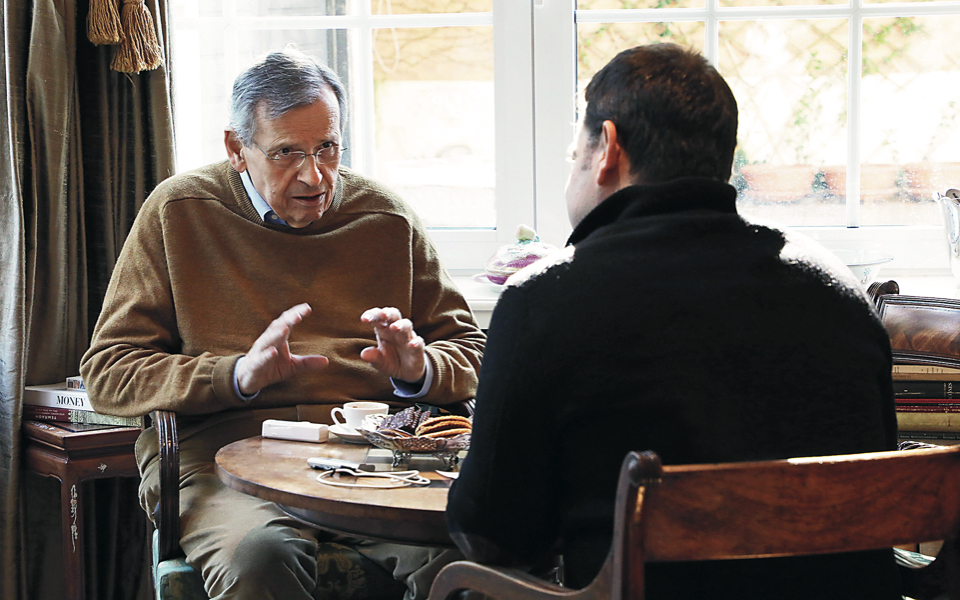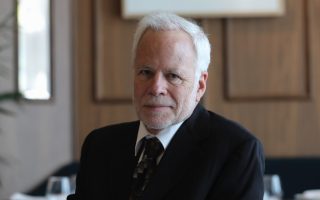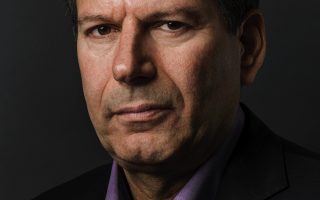Stefanos Manos: ‘Of course the crisis isn’t over’

Twenty years after he founded the Liberals Party and 10 since establishing its successor, Drasi, Stefanos Manos is still pondering the present and the future. The 79-year-old pro-business politician, who served as finance minister from 1992 to 1993 in Constantinos Mitsotakis’ New Democracy government, is renowned for his unconventional ideas and opinions, which he did not hide during our recent discussion at his home in the leafy northern Athens suburb of Ekali. If there is one thing he cannot be accused of, that’s being reserved about his opinions.
With voters getting ready to cast their ballots for MEPs next month, how far have we come since the 2009 European elections – seen as a turning point for Greece and the looming crisis?
I never expected that we would be in the exact same place 10 years later. I was more optimistic.
Isn’t the crisis over, though, since Greece exited the memorandum last August?
Of course not. How much money do we owe? More than we did in 2009.
We’re not paying interest and the loan payments are effectively frozen.
So what if they’re frozen? Don’t we still owe the money? And for how long will they stay frozen? Also, so many young and capable people have left, deaths outnumber births and the banks are zombies. They say they can’t borrow or give out loans. Where is all this going to lead?
Is it likely that Greece will need to apply for a fresh round of funding, as former prime minister Costas Simitis has predicted?
I don’t know whether it will ask for new loans, but the numbers are what they are. We have managed so far because of tourism, but the tourists will not keep coming forever, because maintaining tourism requires investments.
What is your opinion of the administration of Prime Minister Alexis Tsipras?
It’s a terrible government.
Aren’t you impressed by its endurance?
Endurance doesn’t matter. What matters is that no one trusts Greece. Some 500,000 young people have left the country and have no intention of coming back. And some great businesses have left with them. Titan [cement] moved its headquarters. A shift in headquarters also means a shift in interest. Stassinopoulos [metals] is on the way out. Coca-Cola is gone. Why are they leaving? Because they’ve lost their trust. That is what the Tsipras government has accomplished. Previous governments also contributed to this, of course, but this lot came along and made it all worse.
Will the upcoming general elections lead to real political change, a change in the country’s direction, or are we just going to see the same old faces?
The signs I have seen so far point to recycling of the same thing. I see fatigue and disaffection in the people. I wish change would come with [ND chief Kyriakos] Mitsotakis, but the head of a party is not enough – the people around him also need to change. What I don’t like is that Mr Mitsotakis is promising the Greek people that he won’t be firing anyone. There is no bigger provocation. What is he telling us? That as taxpayers we will continue to pay for people who aren’t necessary?
If he says that he will have to streamline the public sector, he will lose the elections.
I’m not so sure that’s true. In 1992-93, I came into fierce conflict with the populist right, which waged war against me – led by Miltiadis Evert, Stavros Dimas and Thanasis Kanellopoulos. That war, however, did not prevent the Athenians from voting for me as MP of Athens in 1993. My steadfastness was rewarded by the people.
Perhaps it was an exception.
What I want to stress is that there is no way to reduce taxes without reducing spending and the only costs that can be cut are salaries. I’m not saying that salaries need to slashed, but staff. I’ll give you an example: We spend 2.2 percent of gross domestic product on defense – coming in second place in NATO – but 75-80 percent of that covers salaries. It is absolutely crucial that we reduce payroll costs, in the military as well, where we have created this system of promotions. Everyone is granted honorary promotions. No. They should stay in their rank.
Which taxes need to be reduced?
Many taxes need to be cut, but I’ll just mention the supplementary tax for large real estate assets. It’s a crime. It has dealt a blow to GDP and to construction, and it also dealt a blow to New Democracy because there were those who ceded to the leftist mentality of ND’s populists.
You will be accused of proposing measures that hurt low-income groups.
Yet I am the one who argues that everyone, regardless, should be granted a pension of 700 euros at the age of 67. No one should get more. And that neither workers nor employers should pay social security contributions, so as to bolster employment. Right now the state already subsidizes the pension system to the tune of 18 billion euros a year. Under my proposal that would come down to 15 billion.
So why hasn’t it happened, if it’s as simple as that?
Maybe because it’s me proposing it.
Global developments are making many people wonder whether there are limits to democracy.
I have no reservations because I see how well democracy works in countries like Switzerland, where a well-informed people were called upon to make the toughest decisions. Even when the populists turned up, they were marginalized by the people.
You have said that in Greece we do not uphold Article 14 of the Constitution, which protects freedom of speech. Can you explain that?
The powerful are especially guilty of this. They don’t express their opinions or invest because they are afraid of retaliation from the state. And they’re right. I remember when I was 36 years old in 1976 and spoke at a European conference on “Young Presidents” at the Astir resort in Vouliagmeni. It was a time of socialism-mania, not just in Greece, but in Europe too. Governments have implemented recipes for statism.
Isn’t it a bit of an exaggeration to say that businessmen are at risk?
They are at risk from a state and a political body that doesn’t respect the law. Many businessmen stay silent, but they milk the state in any way they can. If they open their mouths, they’ll get in trouble, so they keep them shut and reap what benefits they can. The same is the case with university professors.
Is this some kind of middle-class thing?
It’s the attitude of the haves and it’s the result of the country having no leadership. Those who claim to lead cannot even lead themselves.
Do you regard the Prespes name deal as a positive initiative?
Yes, I do think of it as a positive initiative. It ties up a loose end. It would have been better, though, if Mr Tsipras and [former foreign minister Nikos] Kotzias had built more support for it in Greece. That said, I wonder whether consensus is feasible or whether we demand consensus simply to put off any such initiative. Whatever issue arises, everyone wants to participate in a dialogue, but their only objective is to stand in the way of solutions.
There is an issue with the deal with regard to the recognition of the Macedonian language.
Everyone is getting hysterical over the Macedonian language, but there are no hysterics about the Greek language. We don’t care to champion the Greek language, which we have neglected, but are more interested in a language no one speaks.





